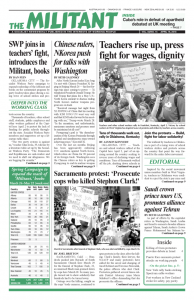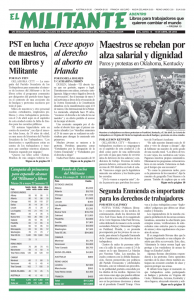LONDON — Sharply conflicting assessments of the historic victory won by Cuban and Angolan forces over the apartheid South African army at the battle of Cuito Cuanavale in 1988 were presented at a daylong conference here March 23. The event, titled “The 30th Anniversary of the Battle of Cuito Cuanavale: Reflections on Southern Africa’s Turning Point,” was hosted by Chatham House, The Royal Institute of International Affairs.
Cuito Cuanavale was “a turning point in the struggle to free the continent and our country from the scourge of apartheid!” explained Nelson Mandela in 1991 in remarks cited by a number of conference participants.
Mandela gave that speech to pay tribute to the people and leadership of revolutionary Cuba for their solidarity. Some 425,000 Cubans volunteers came to aid Angola in repelling successive invasions by the apartheid regime. The decisive victory by the combined forces of Angola, Cuba and Namibia forced South Africa to withdraw from the area, allowed the people of Namibia to achieve independence from apartheid rule, and gave a powerful boost to the mass revolutionary struggle that bought down white-supremacist rule in South Africa just a few years later. The Cuban volunteers’ contribution was “unparalleled for its principled and selfless character,” Mandela said.
The speech is reprinted in Cuba and Angola: Fighting for Africa’s Freedom and Our Own, which contains talks by Mandela, Fidel and Raúl Castro, and other Cuban revolutionaries who fought in Angola. The Pathfinder Press book is available from distributors listed in the directory.
The victory in Angola also gave a boost to the confidence and fighting capacities of working people in Cuba. It enabled them to see the effects of imperialism and to fight against it. It strengthened the fight led by Cuban President Fidel Castro to combat the growing weight of relatively privileged administrative layers in the country. And it put the Cuban Revolution in a stronger position to surmount the massive plunge of its trade after the Stalinist regimes imploded in the Soviet Union and Eastern Europe in the late 1980s and early ’90s.
Conference panelists included Angolan Ambassador Miguel Gaspar Fernandes Neto; Gen. Salviano de Jesus Sequeira “Kianda,” Angola’s minister of national defense; Cuban Ambassador Teresita de Jesús Vicente Sotolongo; Maj. Gen. Roland de Vries, who served in the apartheid regime’s South African Defence Force; Chester Crocker, U.S. assistant secretary of state for African affairs during much of South Africa’s intervention, which Washington supported; Professor Piero Gleijeses from Johns Hopkins University; Professor Vladimir Shubin from the Institute for African Studies of the Russian Academy of Social Sciences; Baroness Northover, the British prime minister’s trade envoy to Angola; and others.
Cuba’s internationalist solidarity, which was decisive in helping the new Angolan government that had won independence from Portuguese colonial rule defend its country, won the hatred not only of Pretoria but of London and Washington. Cuba’s role was supported by Thomas Sankara, leader of the revolution in Burkina Faso in West Africa, and millions of working people in Africa and internationally.
Debate over Cuito Cuanavale
Gen. de Vries tried to dismiss the battle at Cuito Cuanavale, saying it was a small episode in what he called South Africa’s “border war.” South Africa never had any intention to take Cuito Cuanavale, he said. De Vries, an on-the-ground commander with the rank of colonel in 1988, said, “I don’t see myself as having been defeated anywhere.” The army top brass was a major force in ending apartheid, he claimed. “We had argued the government should release Mandela already in 1985.”
De Vries’ attempt to hide the truth was echoed by Crocker, who spoke in a video recording. “Cuito Cuanavale is exaggerated in its significance,” the former U.S. official said. “Fidel Castro very cleverly orchestrated the Cuito Cuanavale ‘victory’ narrative to give cover to, and pave the way for, what Castro really wanted — Cuban withdrawal from Africa.”
Col. Nelson Gonçalves, Angolan defense attaché at their embassy in London, intervened from the floor to answer de Vries. He quoted from the minutes of a South African cabinet meeting in which the government bemoans its failure to take Cuito Cuanavale.
“Cuito Cuanavale was not an isolated action,” Cuban Ambassador Vicente said. The Cubans had significantly escalated the number of its forces up to some 50,000 soldiers in preparation for decisive confrontations: the defensive battle of Cuito Cuanavale and an offensive in southwest Angola.
“In Cuito Cuanavale the South Africans really broke their teeth,” Vicente said, quoting from a Dec. 5, 1988, speech by Cuban President Fidel Castro. “And it all came about with a minimum of casualties for the Angolan and Cuban forces,” Castro said.
“The Cuban-Angolan strategy wasn’t simply to stop the enemy at Cuito Cuanavale, but to gather enough forces and equipment … to strike hard at them on terrain that we, and not the enemy, had chosen,” Castro said. “This change in the relationship of forces was what paved the way for negotiations.”
Vicente explained how the threat to Cuito Cuanavale had arisen because of a disastrous offensive launched by the People’s Armed Forces for the Liberation of Angola (FAPLA) and their Soviet advisers against Mavinga, a town in southeastern Angola, in mid-1987. This was a stronghold of the National Union for the Total Independence of Angola (UNITA), a counterrevolutionary opponent of the People’s Movement for the Liberation of Angola (MPLA) government and ally of the apartheid rulers and Washington.
The Cuban leadership “expressed its concern” with the Soviet’s proposed offensive, Vicente said. Mavinga presented a logistical nightmare to get supplies to their troops, and it would inevitably provoke a South African intervention. Cuba refused to participate.
The inevitable South African response — with troops and aircraft — inflicted heavy casualties on the Angolan forces, who fought courageously but were decimated, Vicente said. They retreated to Cuito Cuanavale.
Cuba’s role decisive
“Cuito Cuanavale was going to fall if Cuba didn’t intervene,” Piero Gleijeses said by video. Gleijeses is author of two books — Conflicting Missions and Visions of Freedom — that describe the roles of Cuba, South Africa, Washington and Moscow during this struggle for African freedom.
Cuba’s revolutionary leadership decided to commit armed forces in support of Angola out of internationalist solidarity, and did so in the face of Soviet opposition, Gleijeses said. Throughout the campaign, Fidel Castro and the Cuban high command were at loggerheads with Moscow and the Soviet military leaders over the politics of the war, its international context and how to conduct it militarily.
The scope of Cuba’s commitment of troops, planes and armaments was decisive — and on a scale that the Cuban leaders later said could have exposed the revolution to attack.
In addition to the formal conference proceedings, the Cuban government prepared an attractive photo display on the struggle.
Pathfinder Books was invited to have a stand. Copies of Gleijeses’ books were among the £105-worth ($150) of literature participants got. Other books sold included Cuba and Angola: Fighting for Africa’s Freedom and Our Own and Cuba and Angola: The War for Freedom by Harry Villegas.

